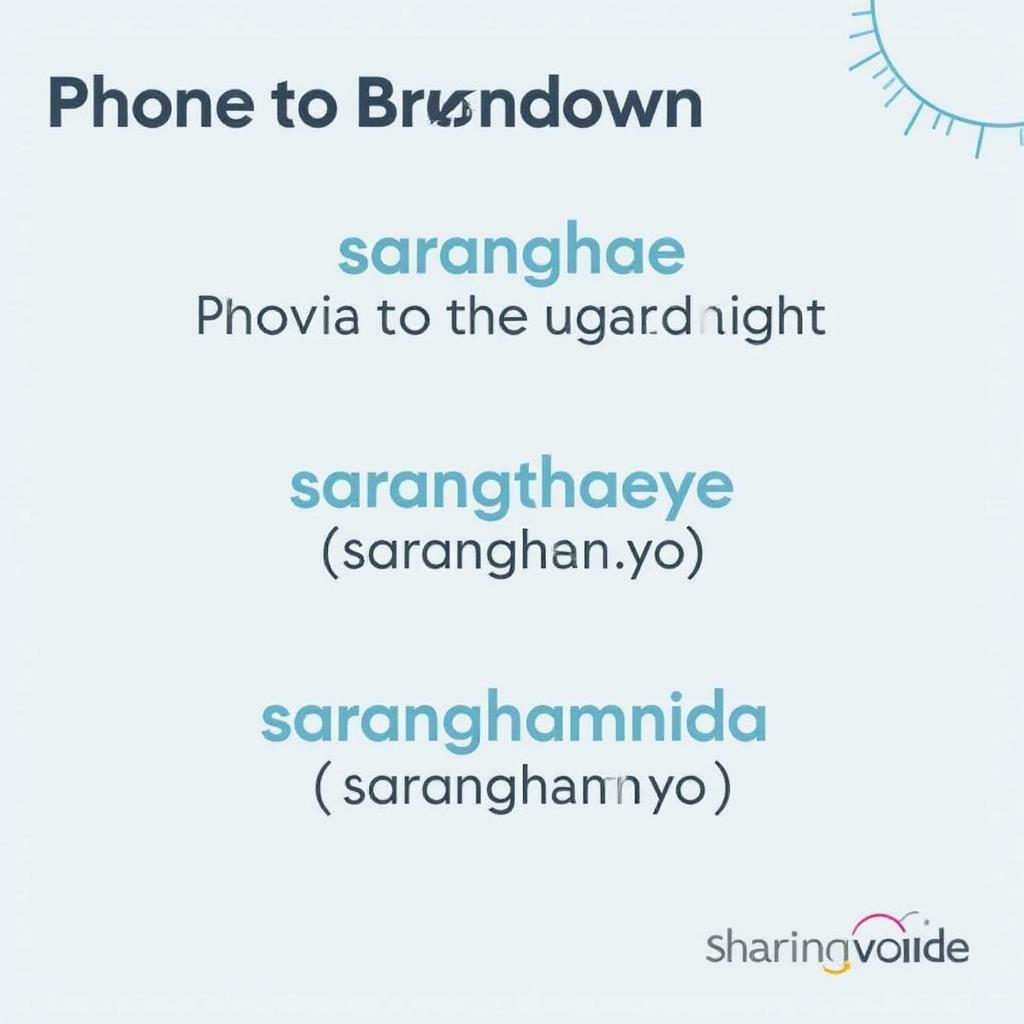Learning how to say “I love you” in Korean is more than just memorizing words; it’s about understanding the nuances of expressing affection in Korean culture. Whether you’re a K-drama enthusiast, learning the language, or simply looking to impress someone special, this guide will equip you with the perfect phrases to convey your feelings.
Different Ways to Say “I Love You” in Korean
There are several ways to express love in Korean, each with varying degrees of formality and intensity. Let’s explore some of the most common expressions.
Saranghae (사랑해) – The Most Common Expression
“Saranghae” (사랑해) is the most common and versatile way to say “I love you” in Korean. It’s suitable for close relationships like family, friends, and romantic partners. Think of it as the Korean equivalent of “I love you.”
Saranghaeyo (사랑해요) – The Polite Form
“Saranghaeyo” (사랑해요) is the polite form of “saranghae.” Use this version when speaking to someone older than you or someone you don’t know well. It shows respect and maintains a level of formality.
Saranghamnida (사랑합니다) – The Formal Expression
For situations requiring the utmost respect, such as addressing elders or superiors, “saranghamnida” (사랑합니다) is the most appropriate choice. This formal expression conveys deep affection and reverence.
Other Expressions of Affection
Beyond the direct “I love you,” Korean offers various phrases to express fondness and care. “Choahae” (좋아해) translates to “I like you” and is often used in the early stages of a romantic relationship or between friends. “Neomu choahae” (너무 좋아해) adds emphasis, meaning “I like you very much.” You can also use “bogoshipo” (보고싶어) which means “I miss you” to express longing and affection.
 Saying "I love You" in Korean
Saying "I love You" in Korean
Beyond the Words: Expressing Love in Korean Culture
While verbal expressions are important, understanding the cultural context is crucial for effectively communicating love in Korean. Koreans are generally more reserved in expressing emotions outwardly compared to some Western cultures. Grand gestures of affection might not be as common, but subtle actions and thoughtful gestures hold significant meaning.
Gift Giving
Gift-giving is a significant part of Korean culture. Presenting a thoughtful gift is a way to express love and appreciation, whether it’s for a birthday, holiday, or just to show you care.
Acts of Service
Acts of service, like helping with chores or running errands, are another way to demonstrate love and care. These practical gestures can be more meaningful than grand pronouncements.
Pronunciation Tips for Saying “I Love You” in Korean
Correct pronunciation is key to ensuring your message is understood clearly. Here’s a breakdown of how to pronounce each phrase:
- Saranghae (사랑해): “Sa-rang-hae” with emphasis on the second syllable.
- Saranghaeyo (사랑해요): “Sa-rang-hae-yo” with a slight emphasis on the third syllable.
- Saranghamnida (사랑합니다): “Sa-rang-ham-ni-da” with a slight emphasis on the fourth syllable.
 Pronouncing Korean Love Phrases
Pronouncing Korean Love Phrases
When to Say “I Love You” in Korean
Like any language, timing is important. While the specific timing depends on the individual and the relationship, expressing “I love you” too prematurely might be perceived as insincere. Gauge the relationship dynamic and choose the right moment to express your feelings genuinely.
Conclusion
Learning how to say “I love you” in Korean opens a door to deeper connection and understanding within Korean culture. Whether you use “saranghae,” “saranghaeyo,” or “saranghamnida,” remember that sincerity and respect are key to truly expressing your affection. So, go ahead, express your love in Korean and create meaningful connections. How many episodes of Love Undercover? Find out here. Also, learn about what’s the difference between love and in love.
FAQ
- What is the most common way to say “I love you” in Korean? (Saranghae)
- How do you say “I love you” formally in Korean? (Saranghamnida)
- What does “bogoshipo” mean? (I miss you)
- When is it appropriate to say “I love you” in Korean? (Depends on the relationship and individual)
- What are some non-verbal ways to express love in Korean culture? (Gift-giving, acts of service)
- What’s the polite form of “saranghae”? (Saranghaeyo)
- Is there a Korean phrase for “I like you”? (Choahae)
Do you want to know when can I make love after giving birth? Check it out here. You might also be interested in knowing does love revolution have season 2?
Need further assistance? Contact us at Email: contact@daiduongtranhba.com, address: Michigan Ave, Suite 3100, Chicago, IL 60611, USA. We have a 24/7 customer support team.


